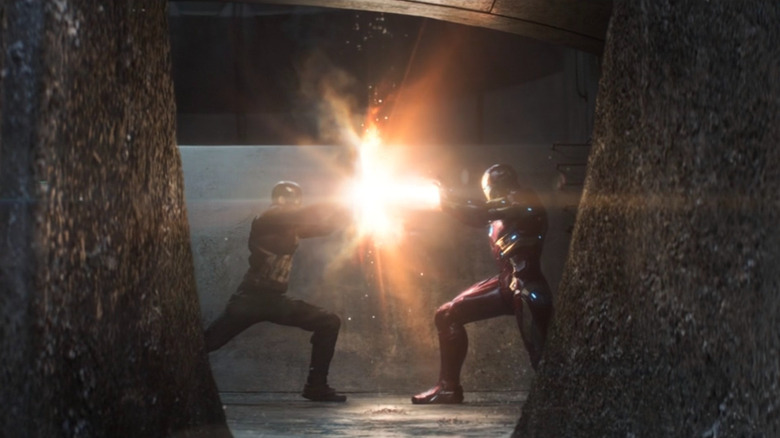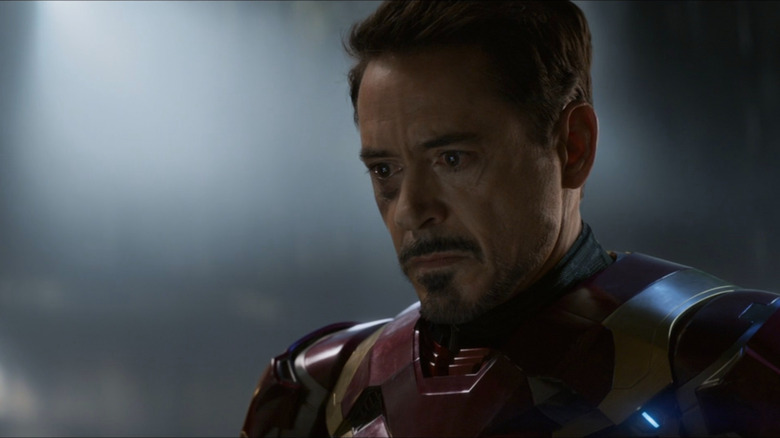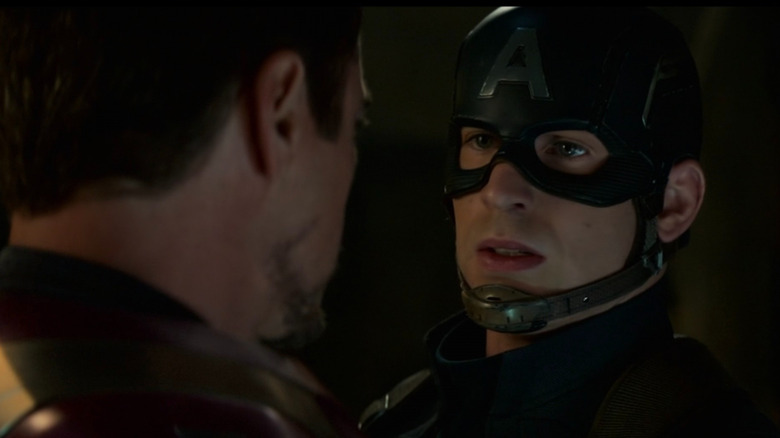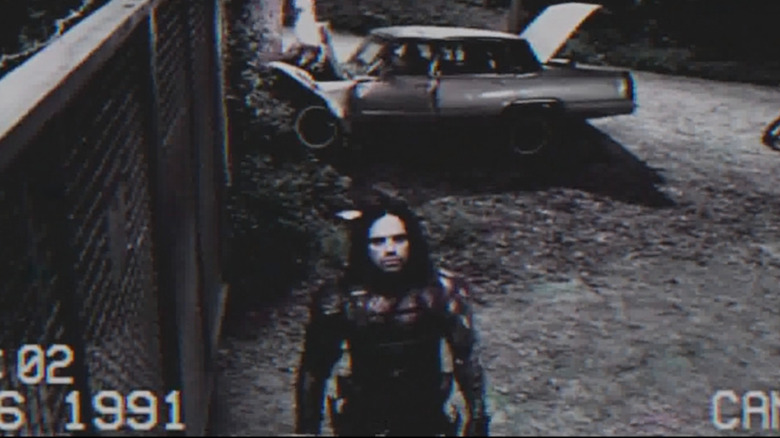Captain America: Civil War Was All Setup For A Single Scene
Years before Marvel Studios would get to have their big payoff with "Infinity War" and "Endgame," there was the little matter of positioning Iron Man and Captain America on opposing sides. These two have always been a little snippy with each other since their first meetup in "The Avengers," and while they grew to trust one another as friends, there was always that small bit of ideological disconnect silently (and not so silently) brewing between the pair.
One of my favorite scenes from "Age of Ultron," which has grown on me quite a bit in recent years, is that middle stretch at Hawkeye's farm, where the dissonance between tired heroes Tony Stark (Robert Downey Jr.) and Steve Rogers (Chris Evans) is starting to grow. Not only did it show the cracks in each of their armor, it also planted the seeds for their eventual showdown in "Captain America: Civil War."
Of course, while we were all looking forward to the Avengers showdown of the century, the film's most important scene is one that precedes the main event, a sentiment that the Russos seem to agree with.
The Russos formed the (temporary) death of a friendship around a security tape
While dissecting their career for GQ, the Russos find themselves on the topic of "Civil War" and the security tape that brought down the Avengers, but it was Joe Russo who believed Zemo's big revelation was the foundation of everything the film had built on until this moment:
"That was really the essential idea, that everything in the movie was driving towards, is, "How do we put them on opposite sides, and then how do we create a crisis moment for the two of them, around this very personal revelation?"
What really makes this scene so special is that it's one of the few times where the stakes actually mean something. One of the biggest detriments to the MCU is having this prior knowledge that a character is going to show up in another "Avengers" movie, or get their own Disney+ show, kind of takes the edge off of them being in peril. Even the "Civil War" royal rumble at the airport, while incredibly fun, lacks any real tension that they may be hurt or even die. It feels like everyone is pulling their punches, and when they do get one in, it's accidental.
The opening makes it appear that Bucky's acquisition of the super-soldier serum was just another job, when in fact, the car he pulls over holds none other than Howard (John Slatter) and Maria Stark (Hope Davis). When Zemo (Daniel Brühl) unleashes the bombshell that Bucky (Sebastian Stan) was behind their death, albeit inadvertently, you're presented with three different, albeit similar perspectives that make for a great pre-confrontation.
Tony Stark, the heartbroken
At the top of "Civil War," Tony is seen repurposing Quentin Beck's B.A.R.F. technology as a tool to process his grief through the last time he saw his parents alive. Needless to say, he's got mommy and daddy issues on his mind. With Zemo directing him toward the screen, a security tape starts to play, and we're brought back to that opening scene, just as Tony is. With the truth right in front of him, he's given blunt answers to questions he regrets having asked.
Robert Downey Jr. is one of the MCU's most important actors, and this scene proves why. The gradual progression of anguish as he watches a mind-controlled Bucky punch his father and choke his mother is legitimately heartbreaking to watch unfold, especially once he realizes that Steve had prior knowledge of it. Tony's entire involvement with Stark Industries and the "Iron Man" persona can be traced back to the night a barely adult child lost his parents. Naturally, that sends him over the edge in trying to take out the Winter Soldier once and for all.
The fact that Bucky was under HYDRA's control doesn't really matter at this point because as we've learned in the MCU, just because someone is presented with an opportunity to temporarily suppress their emotions and realize this is what the antagonist wants, doesn't mean they will. Tony's "I don't care. He killed my mom" in the big fight just about shows his wounded inner child taking the reins.
Steve Rogers, the spectator
With this technically being a "Captain America" movie, naturally, Steve is continuing to find his place in a world where established trust can be easily broken. It's not enough that the reveal of HYDRA forces woven within S.H.I.E.L.D.'s infrastructure has made him leery about organized governmental powers being honest. With Tony in emotional shambles, Steve becomes the mistrustful one, even if he knew this couldn't be changed. Joe Russo knows as much (via GQ):
"The fact that, you know, Cap in Winter Soldier, stood at a monitor, and seen in fair proximity, a photo of Bucky and a photo of Tony's dead parents. And the retrofitted concept was that Bucky was actually responsible for that. It was the implication at the time, although we didn't know whether we wanted to push it that far. But once we decided to make Civil War, we said, "Let's solidify that, what if footage existed of Bucky murdering Tony's parents? And what if Tony saw that footage? And what if Tony saw that footage in front of Cap; what would happen?"
Once the tape starts playing on the monitor, Steve watches it like someone who knows they're about to see a car wreck (literally) and can't do anything to stop what's about to happen next. It had eluded me how Steve knew about this particular assassination, but it dawned on me later that he most likely got the information from Arnim Zola's HYDRA info dump in "Captain America: The Winter Soldier." I love it when Tony asks him if he knew Bucky was behind his parents death, and he responds with, "I didn't know it was him," if only because it sounds like the kind of "yeah ... but" you would give to your parents if they thought you did something wrong.
James Buchanan Barnes, the involuntary assassin
Thanks to "The Falcon and the Winter Soldier," we now know the extent of Bucky's guilt for the involuntary hit jobs, and the lengths he's going to in order to make amends to the families of his victims. But before he can attempt to atone, he's perhaps the most tragic of the three in this scene, a former pawn who has to sit there and relive his assassination mission unfold all over again. He's an inherently quiet character, but probably knows that nothing he says will give Tony any solace or reprieve from his emotions. It's not enough that Bucky kills the Starks, but he does so with the brute force of his metal arm for Howard, and the slow strangle with his bare hand for Maria.
The people truly responsible for the tragedy are long dead, leaving the vessel of their atrocities behind to face the music alone. There isn't much coverage of Bucky while Tony watches the tape. You can see it all unfold in Bucky's expressionless face as he gets the job done. One little detail that hit harder on subsequent viewings is Howard calling out Bucky as "Sergeant Barnes." The vastly different appearance between Slattery and Dominic Cooper can make it easy to forget that this is the same character, and that in his final moment, Howard is confronted by the ghost of a soldier he used to know.
We all knew the fight was inevitable, but it's how Stan, Evans, and Downey Jr. guide these characters into this pivotal moment that makes it special. Even in those cases when Marvel Studios struggles with the factory filmmaking of it all, these characters manage to shine through.
"Captain America: Civil War" is currently streaming on Disney+.




